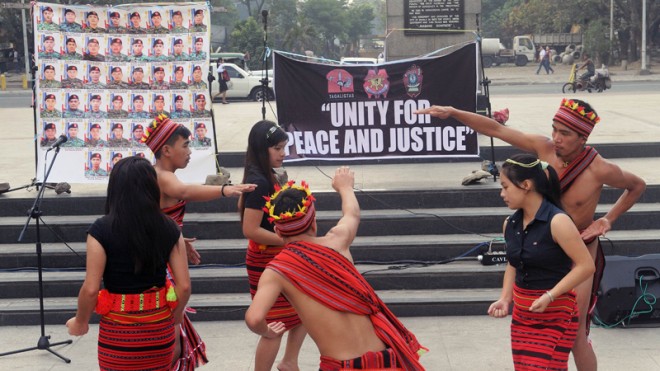Amid war dance, calls for calm

Indigenous students call for “Unity for Peace and Justice” as they perform an Ifugao ritual dance in Manila on Feb. 7, 2015, in front of a display of photos showing the 44 elite commandos who died in a police raid in Mamasapano town, in the southern island of Mindanao during a mission in January to capture one of the world’s most wanted terrorists, Bali bomber Zulkifli bin Hir. AFP PHOTO/Jay DIRECTO
BAYOMBONG, Nueva Vizcaya—Local and tribal leaders on Sunday appealed for calm amid calls for vengeance from family, friends and sympathizers for the deaths of three Ifugao Special Action Force (SAF) commandos at the hands of Moro rebels in Maguindanao province.
Ifugao Rep. Teodoro Baguilat Jr. dismissed speculation that the relatives and friends of the slain troopers were out to exact revenge, following the staging of a “him-ong,” a tribal ritual said to be equivalent to a war dance.
“We appeal to our people not to put extra meaning to rituals like [the him-ong] because this is not the way to honor our departed heroes,” he said in a telephone interview.
Baguilat said he was trying to quell misconception, especially on social media, that the Ifugao had pledged to avenge the deaths of PO3 Robert Allaga, PO3 Franklin Danao and PO2 Joel Dulnuan.
They were among the 44 SAF troopers slain in clashes with the Moro Islamic Liberation Front (MILF) and the Bangsamoro Islamic Freedom Fighters (BIFF) on Jan. 25.
Article continues after this advertisementDancing ‘warriors’
Article continues after this advertisementOn Feb. 3, tribal leaders and family members in the upland village of Poitan in Banaue town staged a him-ong during burial rites for Allaga, regarded as a hero for giving up his life for another SAF commando, PO3 Robert Lalam of Kiangan town, his distant cousin.
Photos of the ritual went viral online with media reports and online comments claiming the Ifugao people were out to seek revenge.
The website of Nurturing Indigenous Knowledge Experts (Nike), a cultural preservation program in Ifugao, defines the him-ong as a dance performed during burial rites of an Ifugao who has been killed.
In this ritual, community members dressed in native attire perform a dance that simulates actions in battle between spear-wielding warriors, Nike said.
As they approach the burial site, performers dance to the beat of a “bangibang,” a wooden percussion instrument, and to chants, usually by women, that narrate the story of the battle and beseech the gods to bring misery to those responsible for the death of a tribal member.
The ritual is traditionally staged by Ifugao people not necessarily to vow revenge but mainly to appease the gods and ask that such a tragic death be the last in the community, Baguilat said.
He said the people’s expressions of outrage should be taken only as “part of the healing process” and these should not foment further animosity among Filipinos.
“We know of many stories of how Cordillerans and other tribes have been living peacefully with Muslims,” he said.
Supt. John Luglug, Nueva Vizcaya police director and a cousin of Allaga, said that while their clan was deeply hurt by Allaga’s violent death, exacting revenge had no place in modern times.
“I don’t think there is a need for revenge. As God has said, ‘Revenge is mine,’” he said.
Family members of Dulnuan also dismissed sentiments of vengeance but hoped the government would show its resolve to make the perpetrators answer for their crimes.
“We will just let the wheels of justice take its course. We will closely follow what the government will do about this,” said Carmen Dulnuan, the slain SAF commando’s mother.
Mourning in Isabela
In Isabela province, at least 2,000 people in Aurora town on Sunday joined the funeral march for PO3 Andres Duque Jr., one of the slain troopers.
Duque’s wife, Melanie, said she would cherish the memory of her husband for offering his life for the country.
“Their heroism is for the next generation. This is our only consolation as we grieve,” she said.
Duque, 37, left behind three children, ages 13, 12 and four months. He served at SAF for eight years.
“We are grieving. I could barely say the word ‘beautiful’ due to my father’s fate. However, I thank everyone for the sympathy as we mourn our father’s loss,” said Duque’s daughter, Nicole Andrea Lein, 13.
Two other slain SAF commandos from Isabela—PO3 Rodrigo Acob Jr. and PO1 Loreto Capinding II—were buried in their hometowns last week.
In a statement, Interior Secretary Manuel Roxas II said the government had not been “selective” in extending help and compassion to the families of the slain SAF troopers.
“All the financial, educational, livelihood, medical, housing and other forms of assistance were offered to the families. They were the ones who decided how we could help them most,” he said.
Roxas condolences
Roxas also went to Bataan province early morning on Feb. 5 to visit the wake of PO3 John Lloyd Sumbilla and talk to the slain trooper’s mother and wife.
After his Bataan visit, Roxas said, he proceeded to the wake of PO3 Junrel Kibete in San Jose del Monte City in Bulacan province and condoled with his family.
Earlier, Sumbilla’s mother, Telly, said the family was informed Roxas would visit the wake of her son on Feb. 3 but this was reset to Feb. 4.
She fumed when Roxas failed to show up on Feb. 4 and voiced her frustration to police officials who came that day.
Roxas said he failed to go to Bataan and Bulacan on Feb. 4 because he was called to a meeting by President Aquino.–With a report from Villamor Visaya Jr., Inquirer Northern Luzon
RELATED STORIES
Rights group: Aborting passage of Bangsamoro law not wise thing to do